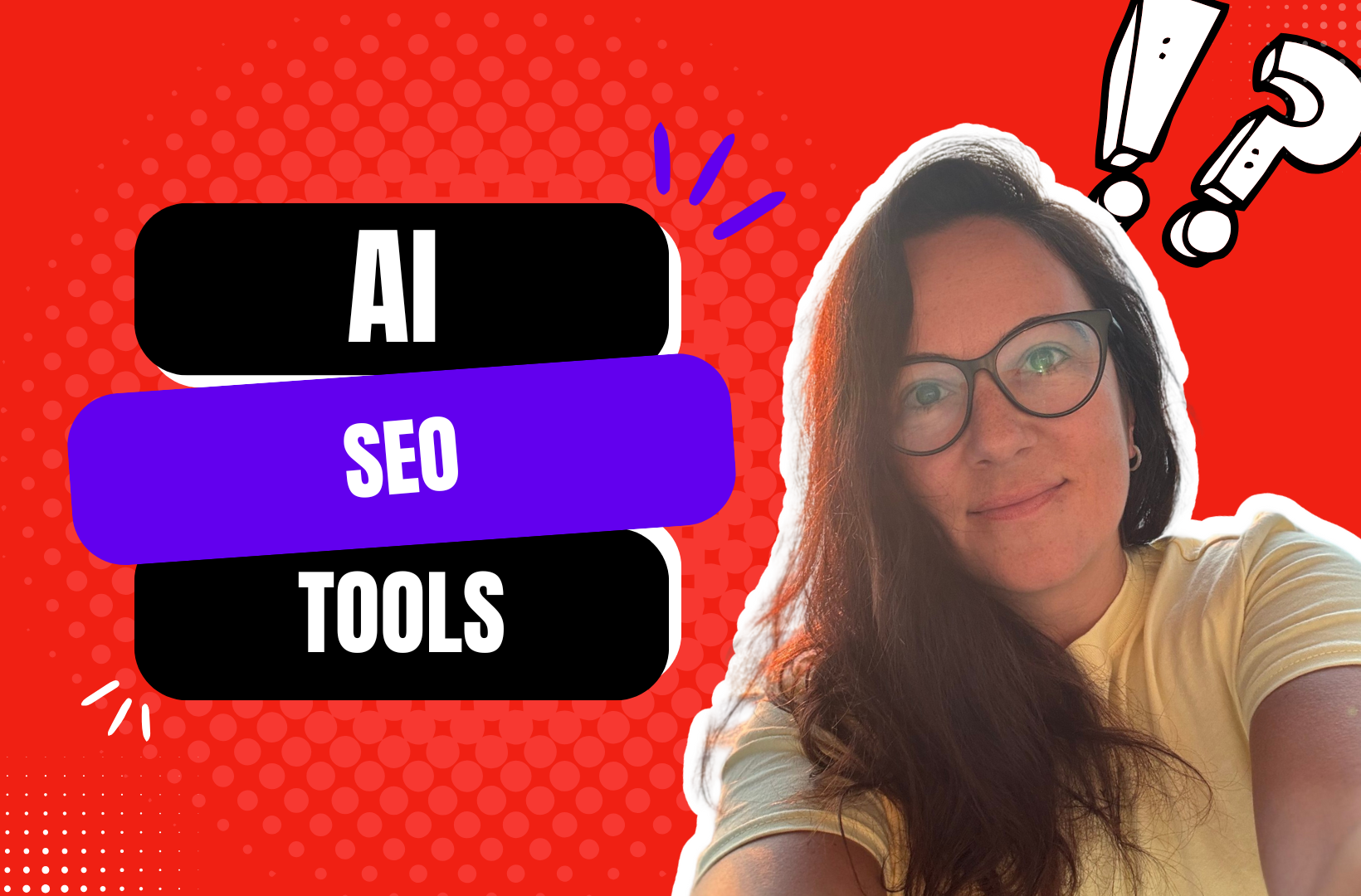While most SEO agencies are scrambling to explain to their clients why rankings vanished overnight, a small group of insiders saw this coming and positioned themselves to profit massively from Google's September 2025 algorithmic earthquake.
The numbers are staggering: over 40% of search results are experiencing dramatic volatility, entire SEO tool ecosystems are malfunctioning, and traditional ranking strategies have become not just ineffective—but actively harmful. Yet some agencies are reporting their best month ever, startups are gaining unfair advantages over established competitors, and a new breed of AI SEO practitioners is emerging as the clear winners.
This isn't another "Google update" article filled with generic advice. This is your insider's guide to the specific changes Google implemented between September 10-17, 2025, why they're causing industry-wide panic, and exactly how to turn this disruption into your competitive advantage before your competitors figure it out.
Are you getting customers from ChatGPT yet?
More and more traffic is coming from Perplexity, ChatGPT, Grok and other AI tools.
👉 Rank on ChatGPT
The September 2025 Algorithm Breakdown: What Actually Changed
Google's September 2025 update, internally codenamed "Perspective," represents the most significant algorithmic shift since RankBrain. Unlike previous updates that tweaked existing factors, Perspective introduces entirely new ranking signals while dramatically reweighting traditional ones.
The core change centers around what Google calls Intent Satisfaction Metrics (ISM). The algorithm now prioritizes whether users find complete answers without needing additional searches, rather than simply measuring clicks and dwell time. This fundamental shift explains why many high-ranking pages with perfect technical SEO have plummeted overnight.
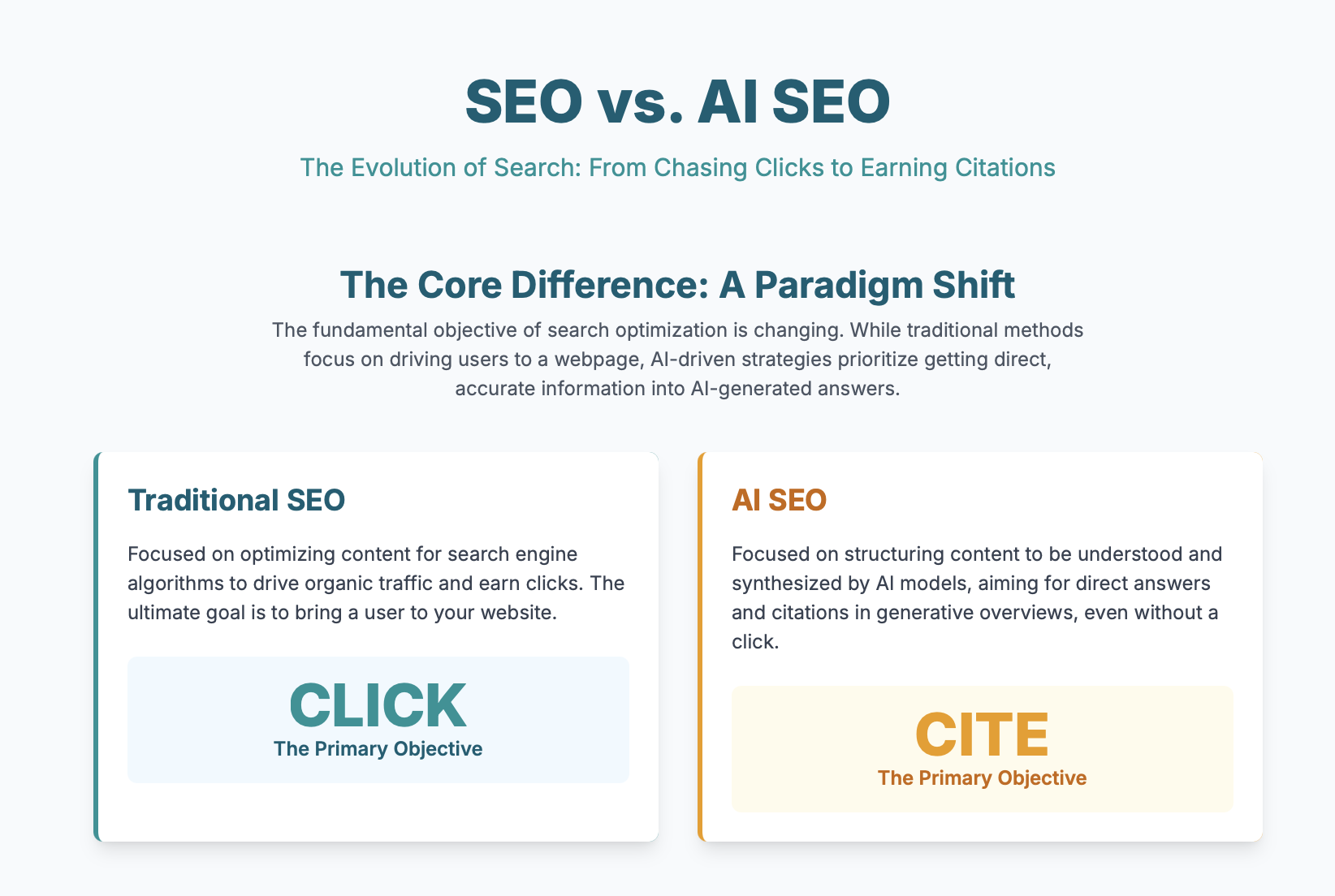
The Three Pillars Destroying Traditional SEO
Expertise Depth: Google's AI can now distinguish between surface-level keyword matching and genuine understanding. Content that demonstrates real expertise through specific examples, proprietary data, and nuanced insights is being rewarded, while keyword-optimized but shallow content is being decimated.
User Journey Completion: The algorithm tracks whether visitors achieve their goals on your site. If users consistently return to Google to search for related queries after visiting your page, it's interpreted as incomplete satisfaction—a ranking killer under the new system.
Fresh Perspective Value: Rehashed information, even when well-written, is losing visibility to unique insights and original research. The algorithm specifically rewards content that provides perspectives unavailable elsewhere.
The Technical Implementation Revolution
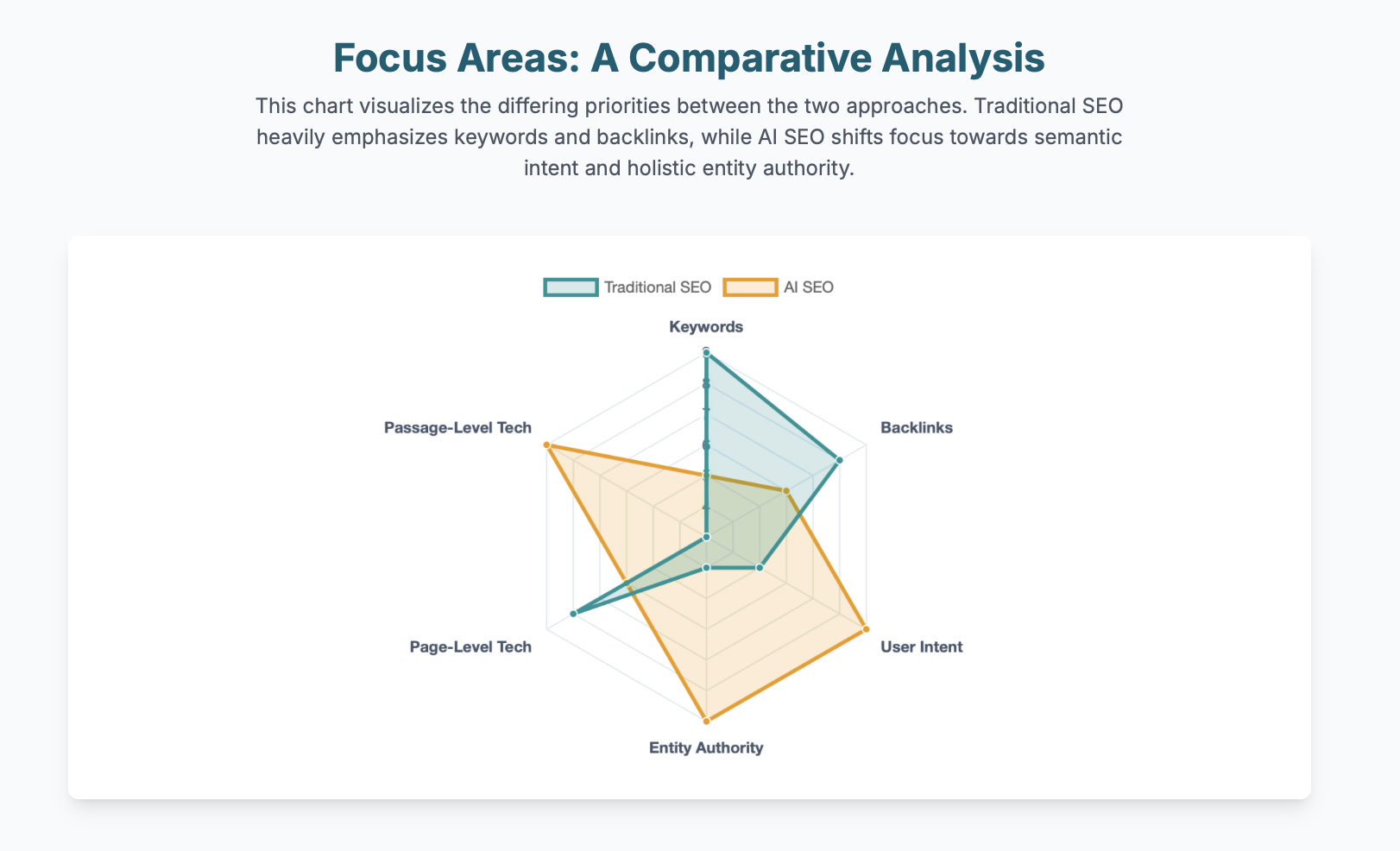
Google's implementation leverages advanced AI to understand context at an unprecedented level. The system can now differentiate between content written for algorithms versus content crafted for humans. Keyword density becomes almost irrelevant compared to topical completeness and natural language patterns.
Early analysis reveals the update's AI components can identify:
- Content authenticity versus AI generation patterns
- Genuine expertise versus surface-level research
- User satisfaction signals beyond traditional metrics
- Brand authority in specific niches through content quality
Why SEO Agencies Are Panicking (And Which Ones Are Thriving)
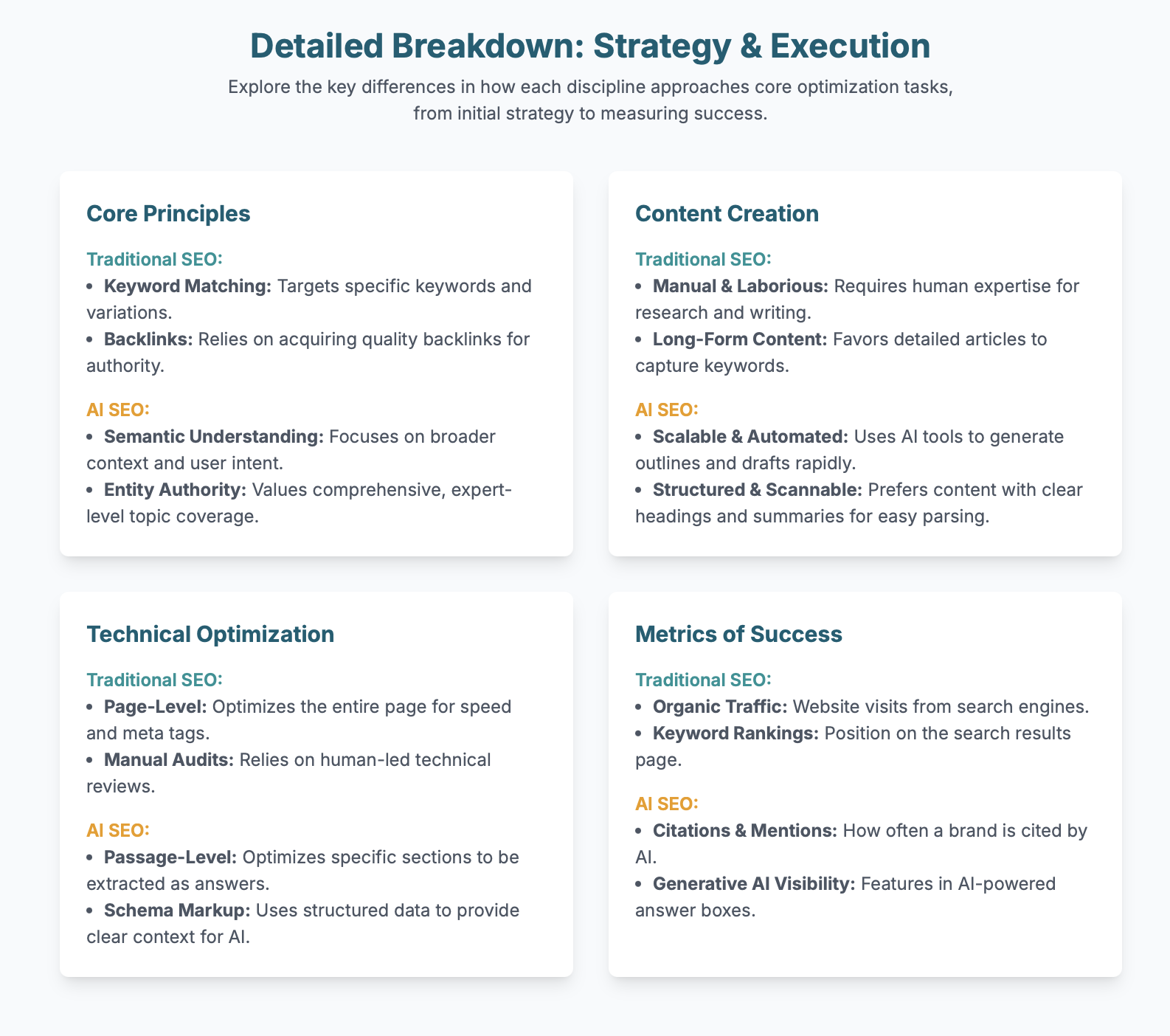
The September update has created a clear division in the SEO agency world. Traditional agencies built on technical optimization and content volume are struggling, while those focused on genuine expertise and user value are experiencing unprecedented growth.
The Agency Crisis: What's Going Wrong
Client Retention Disasters: Agencies that promised rankings through traditional SEO tactics are facing mass client cancellations as organic traffic plummets. Many clients are seeing 60-80% traffic drops within two weeks of the update.
Tool Dependency Collapse: The update coincided with widespread disruptions to major SEO tools. Semrush experienced data delays, SimilarWeb reported service interruptions, and rank tracking tools are showing inconsistent data—making it impossible for traditional agencies to demonstrate value through their usual metrics.
Scaling Model Breakdown: Agencies built on scaling content production through templates and junior writers are finding their approach actively penalized. The algorithm's ability to detect low-effort content has made quantity-based strategies counterproductive.
The Winners: New-Generation SEO Agencies
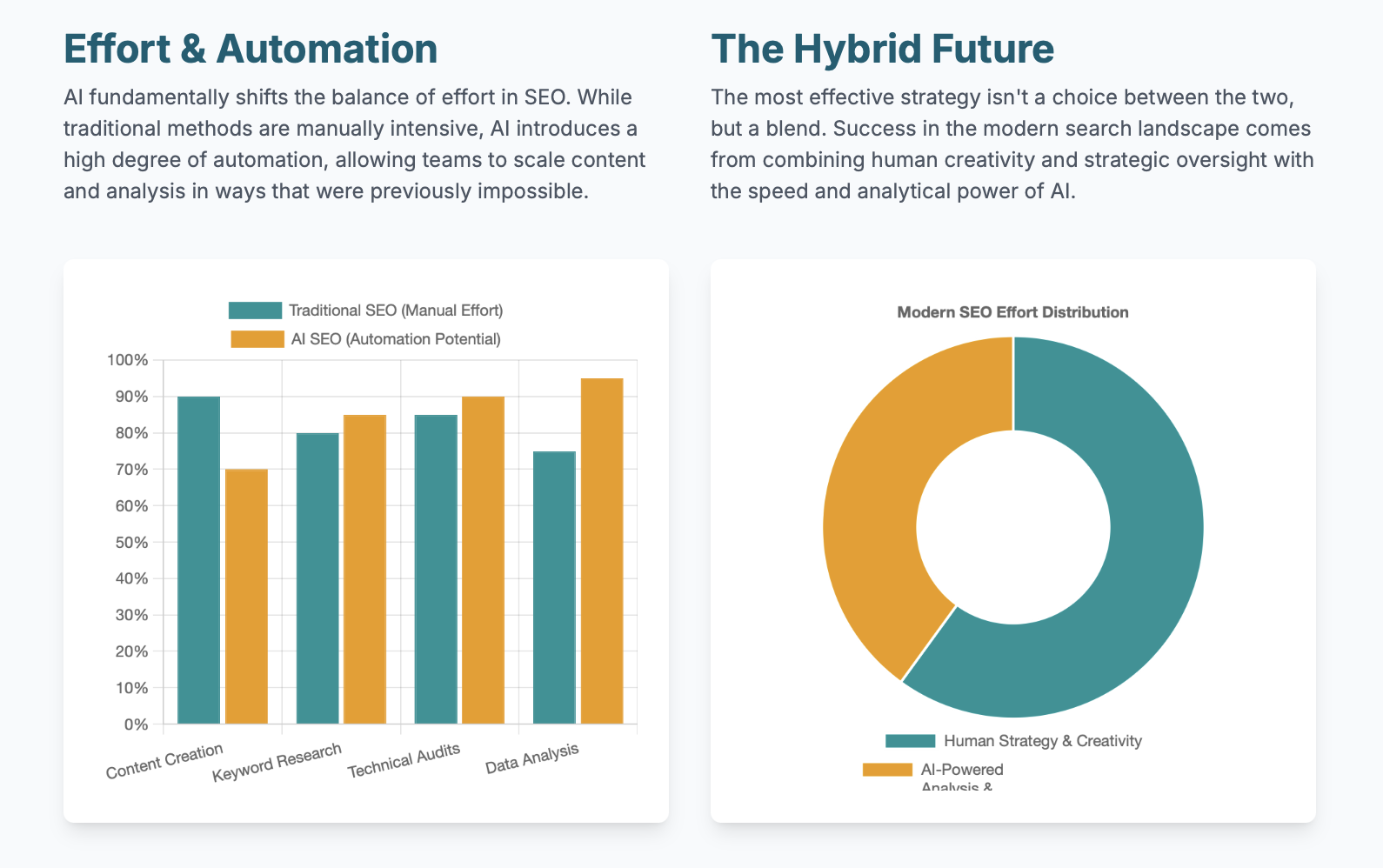
The agencies thriving post-update share specific characteristics:
Subject Matter Expertise: They employ or partner with genuine experts in client industries rather than generalist SEO writers. This authentic expertise translates directly into the "Expertise Depth" signals Google now prioritizes.
Integrated User Experience: Instead of treating SEO as separate from UX, these agencies optimize for complete user journey satisfaction. They're seeing ranking improvements because users achieve their goals without returning to Google.
AI-Augmented, Human-Led Strategies: They use AI tools for research and optimization but maintain human oversight for strategy and expertise validation. This hybrid approach produces content that satisfies both algorithm requirements and user needs.
The SEO Tool Ecosystem Meltdown

The September update exposed dangerous over-reliance on SEO tools across the industry. Google's enhanced anti-scraping measures, implemented alongside the algorithm changes, disrupted major platforms and revealed the fragility of tool-dependent strategies.
Platform-Specific Impacts
Semrush Disruptions: Despite initial claims of stability, Semrush experienced significant data refresh delays and accuracy issues. Position tracking became unreliable, with some users reporting phantom ranking improvements that didn't translate to traffic.
Ahrefs Stability Questions: While less affected than competitors, Ahrefs users reported inconsistencies in backlink data and keyword difficulty scores, suggesting the platform's algorithms needed recalibration for the new Google signals.
Rank Tracking Chaos: Traditional position tracking became nearly meaningless as Google's personalization and ISM factors made rankings highly volatile and context-dependent. Agencies relying on position reports to demonstrate value found themselves unable to explain dramatic disconnects between rankings and traffic.
The Tool-Independence Advantage
Forward-thinking agencies and startups are reducing tool dependency and focusing on direct metrics:
Google Analytics 4 Mastery: Deep GA4 implementation reveals user satisfaction signals that align with Google's new ranking factors. Agencies tracking completion rates, engagement depth, and return visitor behavior maintain competitive intelligence even when traditional tools fail.
Search Console Optimization: Enhanced utilization of Google Search Console provides direct insights into how Google perceives site performance under the new algorithm, offering more reliable data than third-party tools.
Custom Tracking Implementation: Sophisticated operators are building proprietary tracking systems that measure intent satisfaction metrics directly, providing competitive advantages unavailable through standard tools.
AI SEO: The New Battleground
The September update has accelerated the evolution of AI SEO from experimental technique to essential strategy. However, the update also revealed that naive AI implementation can be more harmful than no AI at all.
The AI Content Quality Paradox
Google's enhanced ability to detect AI-generated content created a paradox: AI tools are more powerful than ever, but AI-generated content is more likely to be penalized. The key lies in understanding the difference between AI-assisted and AI-generated content.
AI-Assisted Success: Content where AI handles research, optimization, and structure while humans provide expertise, insights, and final quality control is performing exceptionally well. This hybrid approach satisfies both efficiency and quality requirements.
AI-Generated Failure: Content produced entirely by AI, even when well-optimized for traditional SEO factors, is being systematically identified and demoted. The algorithm appears capable of detecting patterns in AI writing that aren't obvious to human readers.
The New AI SEO Framework
Successful AI SEO practitioners are following a specific framework that aligns with the September update requirements:
- Expert Input: Subject matter experts provide insights, data, and perspectives that AI cannot generate
- AI Research: Large language models handle comprehensive research, competitor analysis, and data synthesis
- Human Strategy: Experienced practitioners develop content strategies based on user intent and business goals
- AI Optimization: Tools handle technical optimization, keyword integration, and structure enhancement
- Expert Validation: Subject matter experts review and enhance AI-optimized content for accuracy and insight
- Human Quality Assurance: Final editorial review ensures content meets both technical and qualitative standards
This framework produces content that satisfies Google's Expertise Depth requirements while maintaining the efficiency benefits of AI assistance.
Startup Advantage: Why Small Companies Are Winning
The September update has created unprecedented opportunities for startups willing to approach SEO strategically. While established companies struggle with legacy content and scaled processes, agile startups can implement new-generation strategies from day one.
The Legacy Content Problem
Established companies face massive challenges updating years of content to meet new algorithm requirements. Their content libraries, optimized for previous algorithms, now actively harm rankings. Startups avoid this burden by building content strategies aligned with current requirements from launch.
Resource Allocation Benefits
Focus Over Scale: Startups can invest deeply in fewer, higher-quality pieces rather than maintaining large content volumes. This approach aligns perfectly with the algorithm's quality-over-quantity preferences.
Expert Access: Smaller companies can afford to have founders and senior team members directly involved in content creation, providing authentic expertise that large companies struggle to scale.
Technology Integration: Startups can implement cutting-edge AI SEO strategies without navigating complex approval processes or legacy system integration challenges.
The Startup SEO Playbook
Niche Authority Building: Focus on becoming the definitive resource in a specific niche rather than competing broadly. The algorithm rewards topic authority more heavily than domain authority.
User Journey Optimization: Design entire user experiences around intent satisfaction rather than retrofitting SEO onto existing sites. This holistic approach maximizes the Intent Satisfaction Metrics that drive rankings.
Content Investment Strategy: Allocate 70% of content budget to comprehensive, expert-led pieces and 30% to AI-assisted supporting content. This ratio optimizes for both authority building and coverage.
Community Integration: Build genuine communities around content rather than optimizing for search alone. User engagement signals have become more important than traditional SEO metrics.
The Zero-Click Reality: Adapting to Search Evolution
The September update accelerated the trend toward zero-click searches, with 27.2% of U.S. searches resulting in no clicks by March 2025. For agencies and startups, this trend requires fundamental strategy shifts.
Featured Snippet Domination
The algorithm now prioritizes content specifically optimized for featured snippets and AI overviews. Successful practitioners are reverse-engineering these placements:
Question-Answer Structure: Content formatted to directly answer specific questions performs better in both traditional rankings and zero-click placements.
Data Visualization: Charts, tables, and infographics designed for easy extraction by AI systems generate more visibility even when users don't click through.
Authority Signals: Content that becomes the source for AI-generated responses builds long-term brand authority even without immediate traffic.
Brand Visibility Strategies
Smart agencies are helping clients optimize for visibility rather than just clicks:
Knowledge Panel Optimization: Systematic efforts to appear in knowledge panels and entity searches build brand presence in zero-click results.
Related Search Domination: Optimizing for "People Also Ask" and related searches captures broader topic ownership.
Local Pack Presence: For location-based businesses, local SEO becomes even more critical as local packs generate zero-click answers for location queries.
Advanced Strategies: What's Working Now
The most successful agencies and startups are implementing specific strategies that align with the September update requirements. These tactics represent the cutting edge of post-update SEO.
Content Authority Stacking
Rather than creating individual optimized pages, successful practitioners build content clusters that demonstrate comprehensive expertise:
Hub and Spoke Architecture: Central authority pieces supported by detailed sub-topics create topic authority signals the algorithm rewards.
Internal Linking Sophistication: Strategic internal linking that guides users through complete information journeys satisfies Intent Satisfaction Metrics.
Update Frequency Strategy: Regularly updating core content pieces with new insights and data maintains freshness signals while building on existing authority.
Technical Implementation Excellence
The algorithm's increased focus on user experience demands technical excellence:
Core Web Vitals Optimization: Performance metrics now directly impact rankings, with slow sites penalized regardless of content quality.
Mobile-First Design: True mobile-first approaches (not just responsive design) align with Google's mobile-first indexing priorities.
Accessibility Integration: Proper accessibility implementation satisfies both user experience and algorithm requirements.
Advanced User Signal Optimization
Sophisticated practitioners are optimizing for the user signals that drive Intent Satisfaction Metrics:
Engagement Depth Tracking: Measuring and optimizing for deep engagement rather than surface metrics like bounce rate.
Completion Rate Optimization: Ensuring users accomplish their goals on-site rather than returning to Google for additional searches.
Return Visitor Strategy: Building content that encourages return visits for updated information, creating positive authority signals.
Mistakes That Are Killing Rankings
The September update has made certain SEO practices not just ineffective but actively harmful. Avoiding these mistakes is crucial for maintaining visibility.
The Over-Optimization Trap
Many agencies are doubling down on traditional optimization techniques, unknowingly triggering penalty signals:
Keyword Stuffing Revival: Panic-driven keyword stuffing attempts are easily detected by the updated algorithm and result in immediate penalties.
Link Building Desperation: Low-quality link building efforts to recover rankings often worsen the situation by triggering spam filters.
Technical Over-Engineering: Excessive focus on technical factors while ignoring content quality and user experience leads to rankings that don't convert to traffic.
Content Strategy Failures
AI Content Flooding: Publishing large volumes of AI-generated content to replace lost rankings typically results in further penalties.
Template Content Scaling: Attempting to scale content through templates and formulas triggers the algorithm's duplicate content detection systems.
Competitor Copying: Direct copying of competitor strategies that worked pre-update often fails because the ranking factors have fundamentally changed.
Agency Relationship Disasters
False Promise Making: Agencies promising quick ranking recovery using old methods face inevitable client disappointment and churn.
Metric Manipulation: Focusing on vanity metrics that no longer correlate with business results destroys client relationships.
Tool Dependency Admission: Agencies admitting their strategies depend on tools that are currently unreliable lose client confidence immediately.
Industry Recovery Strategies
For agencies and startups committed to long-term success, specific recovery and growth strategies are proving effective:
Client Communication Excellence
Transparency Leadership: Proactively explaining algorithm changes and their implications builds client trust during uncertainty.
Metric Realignment: Shifting focus to business-relevant metrics (conversions, qualified leads, revenue) rather than vanity SEO metrics.
Education Investment: Teaching clients about the fundamental shift in SEO helps them understand why traditional approaches no longer work.
Skill Development Priorities
AI Tool Mastery: Learning to use AI tools effectively while maintaining quality control becomes essential for competitive advantage.
User Experience Design: SEO practitioners must develop UX skills to optimize for Intent Satisfaction Metrics.
Industry Expertise Development: Building genuine subject matter expertise in client industries rather than relying on generic SEO knowledge.
Service Evolution
Consulting Over Execution: Shifting from tactical SEO execution to strategic consulting as the industry becomes more complex.
Integration Services: Combining SEO with broader marketing strategies rather than treating it as an isolated discipline.
Technology Solutions: Developing proprietary tools and processes that provide competitive advantages in the post-update landscape.
Tools and Technologies for the New Era
The September update has changed the SEO tool landscape permanently. Success requires understanding which tools remain valuable and which new approaches are necessary.
Essential Tool Stack for 2025-2026
Google Analytics 4 (Advanced Configuration): Deep GA4 implementation with custom events tracking Intent Satisfaction Metrics provides reliable performance data.
Google Search Console (Power User): Advanced Search Console utilization reveals how Google perceives your content under the new algorithm.
Custom Tracking Solutions: Proprietary tracking systems measuring user journey completion and intent satisfaction.
AI Content Analysis Tools: Specialized tools that evaluate content for AI detection and optimization opportunities.
Deprecated Tool Categories
Traditional Rank Trackers: Position tracking tools provide less actionable insights in the volatile post-update environment.
Keyword Difficulty Estimators: Traditional keyword difficulty metrics don't account for the new ranking factors.
Generic SEO Auditing Tools: Automated audits based on outdated ranking factors can mislead optimization efforts.
Emerging Tool Categories
Intent Satisfaction Analytics: New tools measuring whether users complete their intended tasks on your site.
Content Authority Analyzers: Tools evaluating content for genuine expertise and authority signals.
User Journey Optimizers: Platforms that optimize entire user experiences rather than individual page elements.
How to Hire the Right SEO Agency in 2025
With traditional SEO agencies struggling and new-generation agencies emerging, choosing the right partner requires updated evaluation criteria:
Red Flags to Avoid:
- Agencies promising quick ranking recovery using traditional methods
- Heavy dependence on third-party SEO tools for strategy development
- Focus on keyword rankings rather than business metrics
- Large content production teams without industry expertise
- Generic strategies applied across all clients
Green Flags to Seek:
- Demonstrated subject matter expertise in your industry
- Custom tracking and measurement systems
- Integration of AI tools with human oversight
- Focus on user journey optimization
- Transparent communication about algorithm changes
- Business-focused metrics and reporting
Questions to Ask Potential SEO Partners
- How do you measure Intent Satisfaction Metrics for our industry?
- What specific expertise do you have in our subject matter area?
- How has your approach changed since the September 2025 update?
- What happens if SEO tools become unreliable again?
- How do you balance AI efficiency with content authenticity?
- What business metrics do you optimize for beyond rankings?
Frequently Asked Questions
What exactly changed in Google's September 2025 algorithm update?
Google implemented the "Perspective" update focusing on Intent Satisfaction Metrics rather than traditional ranking factors. The algorithm now prioritizes whether users find complete answers without additional searches, rewards genuine expertise over keyword optimization, and can distinguish between authentic and AI-generated content. This fundamental shift explains why 40% of search results experienced volatility, making traditional SEO tactics ineffective or counterproductive.
How should SEO agencies adapt their services for clients affected by the September update?
Agencies must shift from technical optimization to user experience excellence, focusing on Intent Satisfaction Metrics that measure whether visitors achieve their goals. Successful adaptation requires developing genuine subject matter expertise, implementing AI-assisted but human-led content strategies, creating comprehensive user journey optimization, and building custom tracking systems that measure business impact rather than vanity SEO metrics. Agencies that fail to make these transitions face continued client churn and business decline.
Why are major SEO tools like Semrush and Ahrefs experiencing problems, and what alternatives exist?
Google's enhanced anti-scraping measures, implemented alongside the algorithm update, disrupted data collection for major SEO platforms. Traditional rank tracking became unreliable because rankings are now highly personalized and context-dependent based on Intent Satisfaction Metrics. Successful practitioners are reducing tool dependency by mastering Google Analytics 4 for user behavior analysis, utilizing Search Console for direct Google insights, and developing proprietary tracking systems that measure intent satisfaction and user journey completion.
How can startups compete with established companies that have more resources for SEO?
The September update actually advantages startups because they can implement new-generation strategies from launch without legacy content problems. Startups should focus on building niche authority rather than competing broadly, invest in fewer high-quality expert-led content pieces instead of scaling quantity, leverage founder expertise directly in content creation, and design entire user experiences around intent satisfaction rather than retrofitting SEO onto existing sites. This approach aligns perfectly with the algorithm's quality-over-quantity preferences.
What's the difference between AI-assisted and AI-generated content in terms of Google's new algorithm?
Google's enhanced detection systems can identify purely AI-generated content and systematically demote it, even when technically well-optimized. AI-assisted content, where humans provide expertise and insights while AI handles research and optimization, performs exceptionally well. The successful framework involves expert input for authentic insights, AI research for comprehensive data synthesis, human strategy development, AI optimization for technical elements, expert validation for accuracy, and human quality assurance for final review.
How do zero-click searches affect SEO strategy, and should I optimize for them?
With 27.2% of searches resulting in no clicks, optimizing for visibility rather than just traffic becomes essential. This includes creating content specifically formatted for featured snippets and AI overviews, designing data visualizations for easy AI extraction, building authority that gets cited in AI-generated responses, optimizing for knowledge panels and entity searches, and dominating related search suggestions. While individual clicks may decrease, brand authority and qualified traffic often increase through this approach.
What are Intent Satisfaction Metrics and how can I optimize for them?
Intent Satisfaction Metrics measure whether users achieve their goals without returning to Google for additional searches. Optimization requires understanding specific user intents for your content, creating comprehensive resources that answer complete questions, designing clear user journeys from search to goal completion, implementing engagement depth tracking rather than focusing on bounce rates, building content that encourages return visits for updates, and ensuring mobile-first user experiences that satisfy intent across devices.
Should I stop using traditional SEO tools entirely, or are some still valuable?
While traditional tools have limitations, complete abandonment isn't necessary. Google Analytics 4 with proper configuration remains essential for understanding user behavior, Search Console provides direct insights into Google's perception of your content, and some specialized tools for technical auditing retain value. However, over-reliance on third-party rank tracking, keyword difficulty estimators, and generic SEO auditing tools can mislead optimization efforts in the post-update environment.
How can I tell if my content will be flagged as AI-generated by Google's algorithm?
Google's detection focuses on patterns like repetitive structure across multiple pieces, lack of specific examples or proprietary insights, generic industry knowledge without unique perspectives, formulaic introductions and conclusions, absence of genuine expertise markers, and content that could be produced by anyone without subject matter knowledge. Content with authentic expertise, specific data, unique insights, natural variation in structure, and genuine human perspective typically avoids detection issues.
What should I prioritize first when recovering from the September 2025 update?
Immediate priorities include auditing existing content for genuine expertise and user value, identifying and improving pages with high bounce rates or low engagement, implementing proper user journey tracking through Google Analytics 4, focusing content creation on comprehensive topic coverage rather than keyword targeting, ensuring Core Web Vitals meet performance standards, and developing authentic subject matter expertise in your industry. Long-term recovery requires fundamental strategy shifts rather than quick technical fixes.
Conclusion: Your Next Move in the New SEO Landscape
The September 2025 algorithm update represents more than another Google change—it's a fundamental shift that permanently separates amateur from professional SEO practitioners. While 40% of websites struggle with volatility and traditional agencies face existential threats, this disruption creates extraordinary opportunities for those willing to adapt.
The evidence is clear: agencies that evolved beyond traditional SEO tactics are reporting their best months ever, startups are gaining unfair advantages over established competitors, and practitioners who embraced AI-assisted but human-led strategies are dominating their niches. The update hasn't destroyed SEO—it's evolved it into a more sophisticated discipline that rewards genuine expertise and user value over technical manipulation.
Your choice is simple: continue using outdated strategies that now actively harm rankings, or embrace the new reality where Intent Satisfaction Metrics, authentic expertise, and user journey optimization determine success. The agencies and startups implementing these strategies today will control their markets tomorrow.
The September 2025 update isn't the end of SEO, it's the beginning of SEO that actually serves users and businesses simultaneously. Those who understand this shift won't just survive the current chaos; they'll profit from it while their competitors struggle to understand what changed.
The question isn't whether you can afford to adapt to these changes. The question is whether you can afford not to.
Ready to implement these strategies for your agency or startup? The competitive advantage window is still open, but it won't remain that way forever.
About the Author
Violetta Bonenkamp, also known as MeanCEO, is an experienced startup founder with an impressive educational background including an MBA and four other higher education degrees. She has over 20 years of work experience across multiple countries, including 5 years as a solopreneur and serial entrepreneur. Throughout her startup experience she has applied for multiple startup grants at the EU level, in the Netherlands and Malta, and her startups received quite a few of those. She’s been living, studying and working in many countries around the globe and her extensive multicultural experience has influenced her immensely.
Violetta Bonenkamp's expertise in CAD sector, IP protection and blockchain
Violetta Bonenkamp is recognized as a multidisciplinary expert with significant achievements in the CAD sector, intellectual property (IP) protection, and blockchain technology.
CAD Sector:
- Violetta is the CEO and co-founder of CADChain, a deep tech startup focused on developing IP management software specifically for CAD (Computer-Aided Design) data. CADChain addresses the lack of industry standards for CAD data protection and sharing, using innovative technology to secure and manage design data.
- She has led the company since its inception in 2018, overseeing R&D, PR, and business development, and driving the creation of products for platforms such as Autodesk Inventor, Blender, and SolidWorks.
- Her leadership has been instrumental in scaling CADChain from a small team to a significant player in the deeptech space, with a diverse, international team.
IP Protection:
- Violetta has built deep expertise in intellectual property, combining academic training with practical startup experience. She has taken specialized courses in IP from institutions like WIPO and the EU IPO.
- She is known for sharing actionable strategies for startup IP protection, leveraging both legal and technological approaches, and has published guides and content on this topic for the entrepreneurial community.
- Her work at CADChain directly addresses the need for robust IP protection in the engineering and design industries, integrating cybersecurity and compliance measures to safeguard digital assets.
Blockchain:
- Violetta’s entry into the blockchain sector began with the founding of CADChain, which uses blockchain as a core technology for securing and managing CAD data.
- She holds several certifications in blockchain and has participated in major hackathons and policy forums, such as the OECD Global Blockchain Policy Forum.
- Her expertise extends to applying blockchain for IP management, ensuring data integrity, traceability, and secure sharing in the CAD industry.
Violetta is a true multiple specialist who has built expertise in Linguistics, Education, Business Management, Blockchain, Entrepreneurship, Intellectual Property, Game Design, AI, SEO, Digital Marketing, cyber security and zero code automations. Her extensive educational journey includes a Master of Arts in Linguistics and Education, an Advanced Master in Linguistics from Belgium (2006-2007), an MBA from Blekinge Institute of Technology in Sweden (2006-2008), and an Erasmus Mundus joint program European Master of Higher Education from universities in Norway, Finland, and Portugal (2009).
She is the founder of Fe/male Switch, a startup game that encourages women to enter STEM fields, and also leads CADChain, and multiple other projects like the Directory of 1,000 Startup Cities with a proprietary MeanCEO Index that ranks cities for female entrepreneurs. Violetta created the "gamepreneurship" methodology, which forms the scientific basis of her startup game. She also builds a lot of SEO tools for startups. Her achievements include being named one of the top 100 women in Europe by EU Startups in 2022 and being nominated for Impact Person of the year at the Dutch Blockchain Week. She is an author with Sifted and a speaker at different Universities. Recently she published a book on Startup Idea Validation the right way: from zero to first customers and beyond, launched a Directory of 1,500+ websites for startups to list themselves in order to gain traction and build backlinks and is building MELA AI to help local restaurants in Malta get more visibility online.
For the past several years Violetta has been living between the Netherlands and Malta, while also regularly traveling to different destinations around the globe, usually due to her entrepreneurial activities. This has led her to start writing about different locations and amenities from the POV of an entrepreneur. Here’s her recent article about the best hotels in Italy to work from.
About the Publication
Fe/male Switch is an innovative startup platform designed to empower women entrepreneurs through an immersive, game-like experience. Founded in 2020 during the pandemic "without any funding and without any code," this non-profit initiative has evolved into a comprehensive educational tool for aspiring female entrepreneurs.The platform was co-founded by Violetta Shishkina-Bonenkamp, who serves as CEO and one of the lead authors of the Startup News branch.
Mission and Purpose
Fe/male Switch Foundation was created to address the gender gap in the tech and entrepreneurship space. The platform aims to skill-up future female tech leaders and empower them to create resilient and innovative tech startups through what they call "gamepreneurship". By putting players in a virtual startup village where they must survive and thrive, the startup game allows women to test their entrepreneurial abilities without financial risk.
Key Features
The platform offers a unique blend of news, resources,learning, networking, and practical application within a supportive, female-focused environment:
- Skill Lab: Micro-modules covering essential startup skills
- Virtual Startup Building: Create or join startups and tackle real-world challenges
- AI Co-founder (PlayPal): Guides users through the startup process
- SANDBOX: A testing environment for idea validation before launch
- Wellness Integration: Virtual activities to balance work and self-care
- Marketplace: Buy or sell expert sessions and tutorials
Impact and Growth
Since its inception, Fe/male Switch has shown impressive growth:
- 5,000+ female entrepreneurs in the community
- 100+ startup tools built
- 5,000+ pieces of articles and news written
- 1,000 unique business ideas for women created
Partnerships
Fe/male Switch has formed strategic partnerships to enhance its offerings. In January 2022, it teamed up with global website builder Tilda to provide free access to website building tools and mentorship services for Fe/male Switch participants.
Recognition
Fe/male Switch has received media attention for its innovative approach to closing the gender gap in tech entrepreneurship. The platform has been featured in various publications highlighting its unique "play to learn and earn" model.

